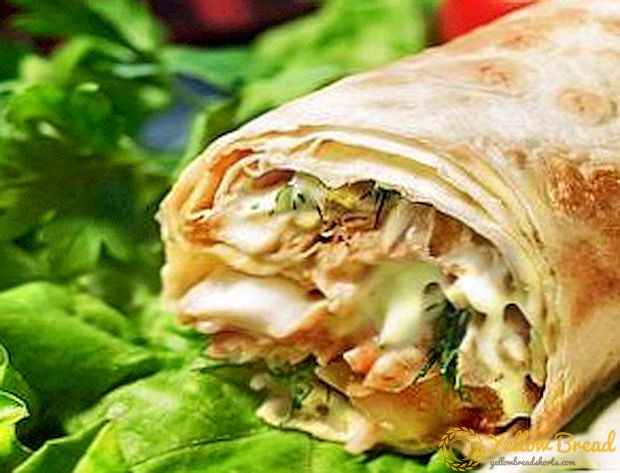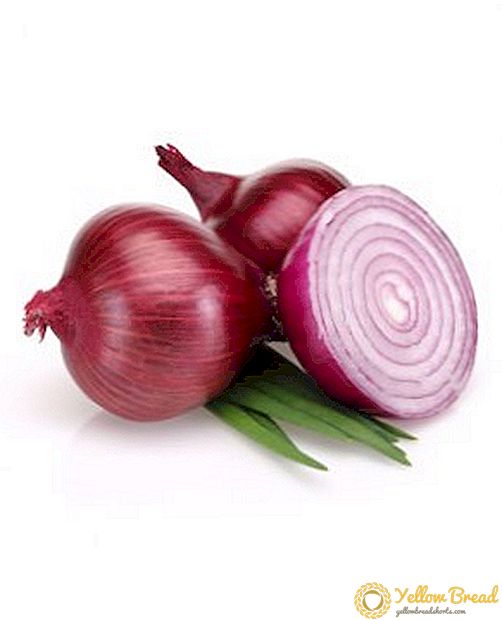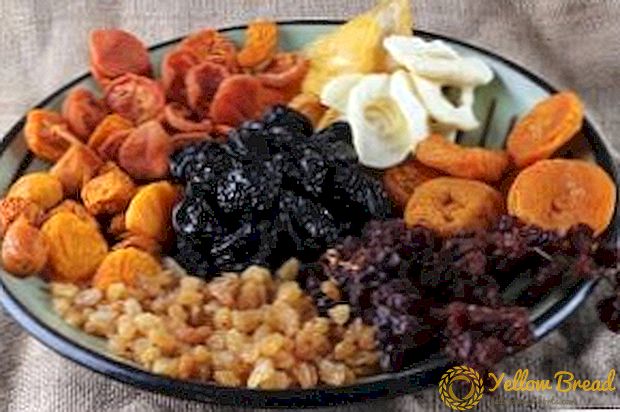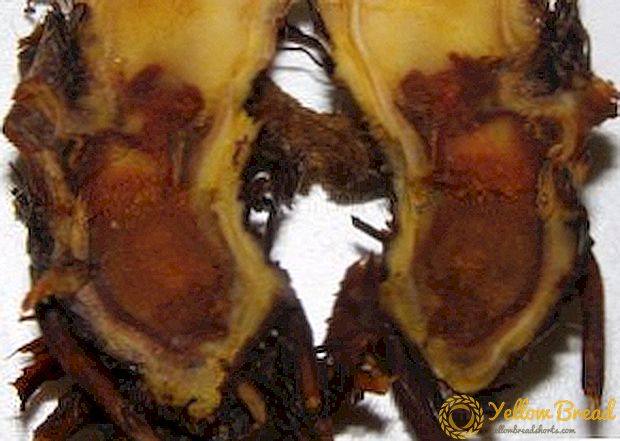
Today, a large number of breeding varieties of apple trees have been created, which can perfectly take root and bear fruit even in the most northern regions. Therefore, today our attention will focus on varieties suitable for planting in the Ural climatic latitudes.
We will also analyze the features of care and planting for the specified varieties.
- The most famous varieties of apple trees for planting in the Urals
- Variety of apple trees "Persian"
- "Silver Hoof" - summer variety of apple trees for the Urals
- Apple variety "Ural Bulk"
- Variety of apples "Uralets"
- Apple variety "Snowdrop" - a winter variety for the Urals
- Apple trees of the Urals - all about leaving
- Pruning apple trees
- Fertilizer features
- Should I water the trees?
- A bit of care in the winter
- We plant Ural varieties of apple trees
- What time to choose for landing?
- Soil requirements
- Now about the landing
The most famous varieties of apple trees for planting in the Urals
The Ural climate zone, even for specially bred varieties, may not be entirely favorable for growing apples.
Variable weather conditions at the most crucial moment, such as flowering, can damage a tree with frost, leaving you without a crop.Therefore, if you are going to plant a garden, it is recommended to select different varieties of apple trees, taking into account such criteria as the vegetative term, the term of ripening of fruits and resistance to low temperatures. On this and other features of the Ural varieties see below.
Variety of apple trees "Persian"

The result of the selection of apple trees "Peach" and "Kungursky Pineapple", this variety has such predominant qualities as large fruit sizes and resistance to frost. In addition to the Ural region, its distribution "Persian" and in the Urals. Autumn variety.
Fruit size hesitates medium to large. The maximum value of the weight of the fruit "Persian" reaches 180 grams. The shape of the apples are round or wide-cylindrical. The skin on almost the entire surface of the fruit is smooth, however, rust can appear near the stem.
Ripe fruits are easy to distinguish by color: when entering into removable maturity, they are greenish, a week after that, their main color becomes cream. The "blush" of apples has a carmine shade, is placed practically on the entire surface of the fetus in the form of stripes.
Cream the pulp by structure fine-grained with a lot of juice. Sweet and sour taste suitable lovers of "crunchy" apples. The pulp contains a very large amount of ascorbic acid, which ranges from 20 to 37.4 mg per 100 grams of apple.
Tree height is average. The crown is not thick, with age from oval turns into spherical. Thick branches, although they are few. In this variety, the nozzles are fruitful, although some of the fruits are formed on one-year growths.
The advantages of this variety are its large fruits with a unique taste. The presentation also comes with its suitability for transport. Stored apples can about 6 months.
When ripe do not fall off on their own from a tree, only a week later can fall from a strong wind. Variety enough resistant to low temperatures. The scab is affected, but less often than other varieties prone to this disease.
Scab affected, but less often than other varieties prone to this disease. Fruiting occurs relatively late - only at the age of a tree of 6-7 years.
"Silver Hoof" - summer variety of apple trees for the Urals

This summer variety has a very extensive zoning for growth, therefore, is known not only in the Urals. It was received as a result of crossing such varieties as "Snowflake" and "Rainbow".
Fruits of the Silverhoof apple variety: description
Fruits are not bigconstituting in mass about 85 grams. They have a very regular round shape, in addition to which is a perfectly smooth skin, covered with a light wax coating. Thick creamy color of the fruit is complemented by a diffuse orange-red topcoat, which stands out very noticeably.
Despite the fact that the pulp Silver Hoof varieties are very dense and fine-grained by its structure, taste, this variety is very good. The juiciness and sweet-sour taste, complemented by a very pleasant aroma, make these apples the favorites of many gourmets.
Tree height is averagemay resemble dwarf varieties. Crohn is not very thick, but has enough a large number of branches. The branches are moving away from the trunk almost at a right angle, which gives the crown roundness. Kolchka and spear are the main bearers. However, part of the fruit is formed on one-year increments.
The main advantage of this variety, in comparison with the previous one, is its speed of entry into fruitingwhich comes in 3-4 years. Good presentation of the fruit can be obtained in the second year after the first harvest.
The good yields and regular fruiting of the Silver Hoof, together with early ripening periods, make it the best Ural variety for fresh consumption, food processing and technical processing. Resistance to low temperatures and diseases is high.
With poor care and reduced soil fertility, the size of the fruit can be greatly reduced. Also, the high humidity of air and soil for a long time makes the tree vulnerable to scab. Also, fruit may be affected by moth, after which they begin to rot.
Apple variety "Ural Bulk"

One more autumn variety apples for the Urals. Breeding variety, whose parents are "Ranetka Red" and "Papirovka". The distribution of the variety is very extensive, including even the Far Eastern region and the Republic of Kazakhstan.
The fruits of this variety are round. Differ smooth and almost glossy surface of the skin. Main Colour ripe apples - yellow with a slight greenish tint, through which they look a bit like lemons. Pulp color of this sort white. High juiciness The fruit is complemented by a pleasant sweet-sour taste.
The amount of ascorbic acid in 100 grams of apple is about 8.8 mg.
Apple tree "Ural bulk": description
Tree srednerosly. Round-drooping crown has a fairly strong density. The main color of the tree bark is gray with a greenish tinge. Fruit-trees and twigs are the "fruitful organs" of the tree.
Fruits are also formed on the gains that were formed last year. Differs tree elongated leaves of light green color.
According to gardeners and farmers, the main advantage of the variety is its high degree of environmental adaptability. But besides this, the variety "Ural Bulk" is skoroplodny - it brings yields already at the age of 2-3 years.
It is very productive, since, on average, about 200 quintals of apples are regularly harvested from one hectare of orchards of this variety. Fruit tree resistant to low temperatures in winter and is easily restored after damage and cutting branches.
Fruits are stored up to two months. Used for consumption both in fresh form, and for making compotes and jam.
The main disadvantage of this variety is small sizes of fruits, for the reason that they do not have a high presentation. The scab was observed, but only during the epiphytotic years.
Variety of apples "Uralets"
Early Autumn Grade suitable for zoning in the entire northern strip of Russia. The variety was bred by scientists of the Sverdlovsk Experimental Station especially for cold regions. For this purpose, the "Kitayka Voskovaya" was used, which was pollinated with the help of pollen from such varieties as "Anis Rose-striped" and "Ukrainka Saratovskaya".
Fruits of the apple tree "Uralets"
Very small fruitsOn average, they all make up about 50-55 grams. Round-conical shapepatched up The surface of the skin of the fruit is smooth but dry. Despite the fact that the main color of fruits is cream, most of them are covered with carmine "blush", located in the form of stripes.
Light cream pulp of the Ural fruit is very juicy. Taste quite unique - spicy and sweet-sour. The maximum content of ascorbic acid in the pulp of ripened fruits is 21.5 mg / 100 grams.
Apple tree: description
A strong-growing tree has a pyramidal crown, whose branches at right angles extend from the trunk. Through the abundance of the harvest, the branches decompose somewhat, giving the tree some roundness. But, the crown is very strong, does not break without help. Type of fruiting spurovy. It is worth noting that the tree "Ural" durable.
High tree frost resistance and disease greatly simplifies the care of him. In addition, the high taste quality of the fruits, which are used in almost all types of technical processing, draws the attention of gardeners to the variety. Fruits ripening in early September can be stored until early November.
Ripening in early September fruits can be stored Total one and a half month, that is, until the beginning of November. The disadvantage is the small size of the fruit and the self-barrenness of the "Ural".
Apple variety "Snowdrop" - a winter variety for the Urals

Zoned in the Urals and Western Siberia, this variety belongs to the winter and was obtained artificially. In particular, the "Snowdrop" is a seedling grown from pollination in a free way of the variety "Vydubetskaya Weeping".
Average fruit sizes. They are round-conical in shape, ribbing characteristic. The skin of the fruit is smooth and shiny, but rather dry to the touch. The color of the fruit is light yellow, but there is a slightly blurry “blush” of reddish color.
Pulp in ripe fruit has white color. In structure, it is dense and fine-grained. Contains a fairly large amount of juice. Taste quality marked by experts as excellent, which are described as sweet and sour.
The chemical composition of the fruit contains about 18.8 mg of ascorbic acid per 100 grams of apple.
The tree is naturally adapted to the adverse conditions of the Urals and the North, as it is a dwarf variety. On seed stocks, the fruit-bearing tree grows up to 2 meters in height.
If it is grafted onto clone stock, it grows only up to 1.5 meters. The crown of the tree is flat-horizontal. Fruits are formed on all kinds of fruit wood "Snowdrop".
The virtue of the variety is its natural dwarf sizes and good adaptability to adverse conditions. Crops, even despite the small sizes of fruits, makes about 80 kilograms from one tree.
The taste and appearance makes the apple "Snowdrop" suitable for sale. Shelf life can be approximately 4 months. Winter resistant variety, practically not affected by scab.
Bonsai very difficult to tolerate prolonged drought and dry air. Therefore, without much care, the quality of the fruit is sharply reduced.
Apple trees of the Urals - all about leaving
Pruning apple trees
The formation of the crown is not only important for the tree itself, but also for you, since the convenient shape will facilitate the process of picking off the fruits. Therefore, already in the first year of growth it is necessary to choose on the sapling a few of the most important branches and prune those that will interfere with their growth.
In the spring, virtually all branches should be pruned to stimulate their growth and promote larger yields.
Fertilizer features

Immediately after planting the tree does not require abundant feeding. However, already in the period of entry into growth in the second year after landing optimum amount of nitrogen, phosphate and potash fertilizers should be applied to the soil.
Fertilizers are best applied with irrigation, which will ensure their quickest access to the roots of the tree.
Should I water the trees?
Abundant watering of apple trees requires only immediately after planting. Thereafter watering a tree is only in very dry periods of the year. Water does not flow directly under the trunk, but pours into a small ditch dug around it.
A bit of care in the winter
In the harsh Ural winters, apple trees require special attention. After all, even the most frost-resistant varieties can be damaged if the earth is frozen too deep.
To prevent this from happening, before the onset of frost, the near-barrel circle is filled with a thick ball of peat and humus, which can be about 7-10 centimeters in height. From above this layer can be sprinkled with leaves and snow.
Recommended for protection against rodents tie a fir-tree. You can set traps, but they do not come across all pests.
Young trees are especially difficult to tolerate winter winds, so they should piquet, which is stuck in the soil near the seedling. You can also tie each branch separately.
We plant Ural varieties of apple trees
What time to choose for landing?
Both autumn and spring are suitable for planting Ural apple trees. It is only important to take into account that landing in the fall should occur in front of the frost, in order to prevent premature growth of seedlings and damage to its low temperature.
In the spring, the optimum time for planting is a period of a few days after the final melting of the last snows and ice. Thus, before the onset of real heat, the tree gradually adapts to the new soil and begins to grow.
Soil requirements
These varieties of apple trees are not particularly demanding on the soil, but still need to take into account several recommendations of gardeners. It is advisable to choose a fertile soil. Highly acidic soils are not desirablehowever they can be extinguished with lime. For the growth of a young tree, the soil must be saturated with nitrogen.
Do not forget that Apple trees are very afraid of groundwaterbecause they can cause root rot. Therefore, if in your garden they come close to the surface, dig a hole or ditch, thus carrying out artificial soil drainage.
Now about the landing
Before direct planting, the seedling must be carefully inspected to see if it is damaged. If there are any, they should be cut off and dip the root system in a clay divorce. After that, the seedling is planted in a hole dug in advance, at the bottom of which a mixture of topsoil and fertilizer should be filled.
It is very important that for tall trees and seedlings with a large root system pit should have a depth of 90 centimeters. For dwarf varieties, the pit can be as deep as 40 centimeters, since their roots are close to the soil surface.
When planting an apple tree, leave the place where the trunk moves to the roots above the ground, so that when it settles, this place is not very deep in the ground. Especially important for dwarf rootstocks to the grafting site did not touch the soil, as a varietal seedling can start up in independent growth and be a tall tree. After planting, we tamp the ground and carefully pour 2-3 buckets of water.






